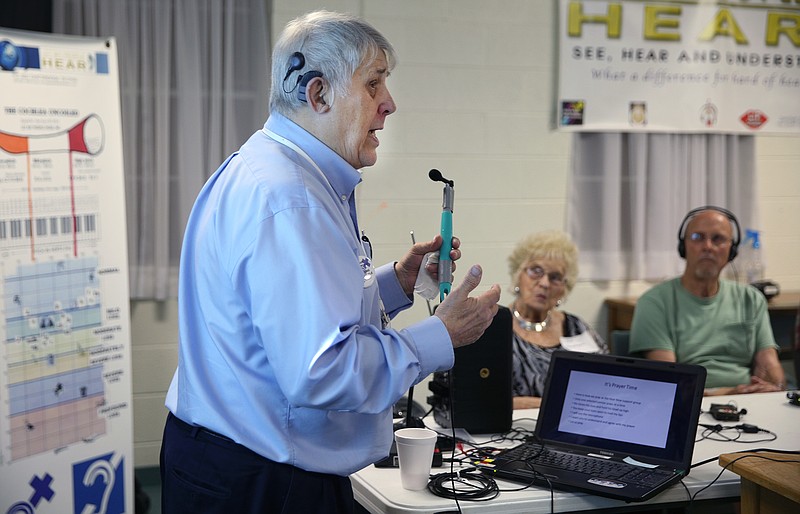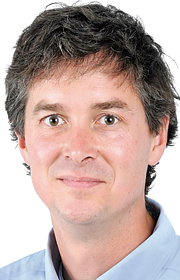Not long ago, the door to the music store opened.
And a deaf man walked in.
"He started talking, honest to goodness ... about a dream and vision he'd had," said Steve Daughtery, owner of the Folk Music Store. "This angel had told him to come down and find me."
The deaf man, in his 80s, had been transformed by a revelation, an epiphany. Standing there, with his wife by his side, he only wanted one thing.
"To play the harp," he said.
"OK," replied Daughtery. "Let's play."
Daughtery, a longtime leader in the folk music scene, was the perfect man for the job. He's a family man who's been affected intimately by disabilities. He's a veteran Little League coach and music teacher who knows the secret formula to both.
"Encouragement," he said.
His Red Bank store is a transformative place. Parkinson's, autism, mental illness - such conditions are no match for the power of music.
"I've got hundreds of beautiful stories," he said. "The limitations put on you by a disability are only as great as you let them become."
So earlier this fall, when the deaf man asked for a harp, Daughtery didn't flinch.
He brought out a pair of autoharps. He began strumming. And instructing. Soon, the man strummed, too.
Daughtery began singing an old gospel favorite. The man, reading his lips, did, too.
Amazing Grace, how sweet the sound ...
Daughtery changed keys; the man stayed on pitch. Daughtery, who'd never seen someone so deaf sing so well, peeked for hearing aids.
"He didn't have any," Daughtery said.
Daughtery, who wrote about this in a recent Mountain Mirror column, sat the man next to an upright bass, leaning him close so he could feel the vibrations.
The bass began to thump: bom diddy, bom diddy ...
The deaf man sat up like bolt, suddenly hearing - feeling - in ways he never had.
Oh Lord, the man said. Oh Lord.
How sweet the sound ...
* * *
It was July 1999. David Harrison, deaf since birth, woke up with a screaming headache. The pain shifted to his eyes, his throat. He couldn't get out of bed.
Then, the phone rang.
Hundreds of miles away, Harrison's twin brother was undergoing emergency surgery for a brain tumor. Harrison believed in the empathetic, mysterious connection twins can have.
It plunged him into despair. Was his brother dying? Was he somehow dying, too?
He turned to fasting, prayer, Scripture.
Five months later, his twin brother died.
He flew to Minneapolis for the funeral. It was Christmastime. Harrison was grieving, confused: how could his brother die and he live? The morning of the funeral, he woke up early to walk the winter streets.
It was a stunning morning. A full moon still in the sky. The whitest snow on the ground. He walked, plunging himself into prayer, surrounded by beauty.
For More Information
Contact David Harrison at letmypeoplehear@yahoo.com for info on hearing-impaired advocacy. Visit the Folk Music Store and Folk School at 3411 Dayton Blvd. or call 423-771-7037.
Harrison, fully deaf in his right ear and mostly deaf in his left, suddenly heard something.
"Music," he said.
The deaf man heard music.
"Harp music and singing," he said. "I could hear it outside and I could hear it in my heart."
It was his revelation, his epiphany. Peace flooded him. The music continued as Harrison's spirit began to receive what he calls his vision.
"The entire story of David's amazing harp," he said.
King David, that is. Harrison immersed himself in studying the Hebrew King David and his harps. He wrote a book. ("The Legend of David's Amazing Harp.") His study was theological and personal; King David never received lessons, Harrison said, yet was able to play.
Could he learn, as well?
Years passed.
From their Brainerd home, Harrison, 83, and his wife Cathy - married 57 years and "still sweethearts," he says - began advocacy work for the hearing impaired. Immensely warm, funny and intelligent, Harrison's also an activist. He started a lip reading academy. Wrote a Bill of Rights for the Hearing Impaired. Trains churches to install FM systems for hearing-impaired worshippers.
The hearing impaired - those who aren't fully deaf - rely on captioning and lip-reading, not always sign language. Yet most places lump all forms of hearing impairment together; you get sign language or nothing.
This happens to him frequently, from City Hall to church pews.
"My mission in life is to help people with hearing loss," he said.
It began that Minnesota winter morning.
Which led him to fight for others.
And brought him, finally, to the door of the Folk Music Store.
The time came for David Harrison - not King David - to play a harp himself.
He walked in.
Daughtery looked up.
And the vision was complete.
They strummed. And sang. "The Old Rugged Cross." "Will the Circle Be Unbroken?" Harrison began to cry. Nearby, Cathy did, too.
"Rejoicing," he said. "Elated. I was walking on cloud nine when I left."
Harrison bought his own harp that day. Once a week, he plays and sings. Invited to a storyteller's conference, he hopes to tell his story, with harp music in the background.
His own harp music.
"God is so good," he said.
How sweet the sound.
David Cook writes a Sunday column and can be reached at dcook@timesfreepress.com.

